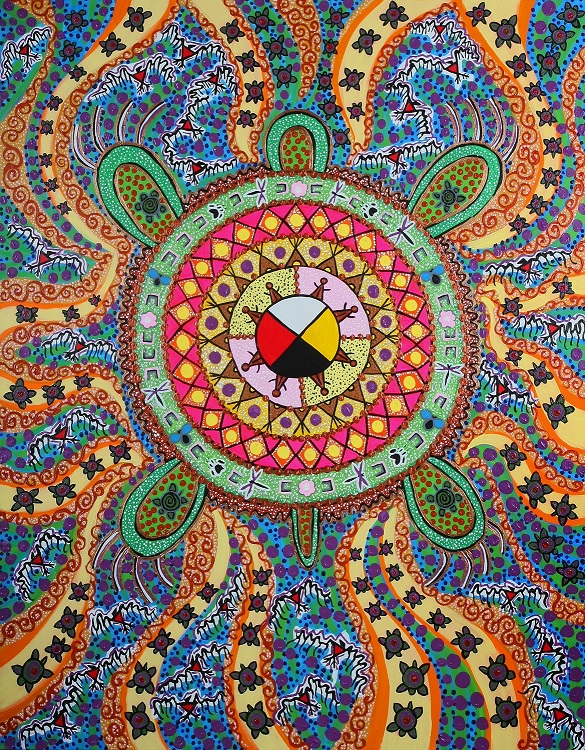Crossing Many Boundaries in Creating Allies: Personal Encounters to Unfolding Science to Privilege Indigenous Knowledge
Abstract
This paper discusses the challenges and experience of two faculty members (one Inuit, one White) as they seek to aid each other in fulfilling the institutional tenure track and program demands made upon them and as they seek to address how to engage teacher candidates in Indigenous knowledge and anti-racist education. There is discussion of practical action and resources for teaching anti-racism through privileging Indigenous knowledge and “unfolding” Eurocentric science, and of the ethical and philosophical challenges and what transpires in negotiating the individual and ethno-cultural difference of each faculty member through an Indigenous gaze (Ermine, 2007).
ôta masinahikanis masinahâmok tânisi e-kî-isi-âyimihocik ôki nîso ataskeskesak (peyak ayaskîmow, peyak wâpiski-wîyâs) ekwa mîna tânisi e-isi-wîcihitocik ôma kâ-masinahikehecik ekwa mina ôhi kiskinwahamâkana tânisi ka-isi-kiskinwahamawâcik iyiniw-kiskihtamowin ekwa namoya ka-pakwâtitohk. mâmiskôcikahtew tânisi ka-isi-atoskahtâkik ôma namoya ta-pakwâtitohk âpacihtâtwawi kihci-iyiniw-kiskihtamowin ekwa mina ka-taswekinamihk moniyawîpinikewin ekwa ta-kwe-miyo-wîpinike mâka ka-ahkâm-mâmawi-atoskâtamihk poko sôskwâc pakwâweyak ta-iyiniw-wâpahtekowisit.
References
Aikenhead, G. (2006). Science Education for Everyday Life. London, Ontario: Althouse Press.
Aikenhead, G., & Michell, H. (2011). Bridging Cultures: Scientific and Indigenous Ways of Knowing Nature. Toronto: Pearson.
Bell, L. A. (2010). Storytelling for social justice: Connecting narrative and the arts in
antiracist teaching. New York: Routledge.
Bennett, M. J. (1993). Towards ethnorelativism: A developmental model of intercultural sensitivity. In R. M. Paige (Ed.), Education for the intercultural experience (pp. 21–71). Yarmouth, ME: Intercultural Press.
Berry, K. (2007). Exploring the authority of whiteness in education: An auto-ethnographic journey. In P. Carr & D. Lund (Eds.), The great white north? Exploring whiteness, privilege and identity in education (pp. 19-32). Rotterdam: Sense Publishers.
Block, A. (2008). Why Should I Be a Teacher? Journal of Teacher Education, 59(5), 416-427.
Brody, H. (2000). The Other Side of Eden: Hunters, Farmers and the Shaping of the World. New York: North Point Press.
Cohen, L., Manion, L., & Morrison, K. (2000). Research Methods in Education (5th ed.). London: Routledge Falmer.
Connell, R. W. (1993). Knowledge, Objectivity and Hegemony. Philadelphia: Temple University Press.
Egbo, B. (2008). Teaching for Diversity in Canadian Schools. Toronto: Pearson Prentice Hall.
Ermine, W. (2007). The ethical space of engagement. Indigenous Law Journal, 6(1), 193-203.
Hodson, D., & Dennick, R. (1994). Antiracist Education: A Special Role for the History of Science and Technology. School Science and Mathematics, 94(5), 255-262.
hooks, b. (2003). Teaching community : a pedagogy of hope. New York ; London: Routledge.
Kemmis, S., & McTaggart, R. (1988). The Action Research Planner. Geelong, Victoria: Deakin University Press.
MacIntosh, P. (1998). White Privilege: Unpacking the Invivisble Knapsack. In P. Rothenberg (Ed.), Race, class, and gender in the United States: An integrated study (pp. 165-169). New York: St. Martin's Press.
Molnar, T. (2009). Welcoming the Other: Understanding the Responsibility of Educators. Unpublished Dissertation, University of Victoria.
Nadeau, R., & Désautels, J. (1984). Epistemology and the teaching of science. Ottawa, Canada: Science Council of Canada.
Poole, R. (1972). Towards deep subjectivity. London: Allan Lane
Sammel, A. (2009). Turning the focus from 'Other' to science education: exploring the invisibility of Whiteness. [Forum]. Cultural Studies of Science Education, 4, 649-656.
Thompson, A., & Cuseo, J. (2009). Diversity and the College Experience. Dubuque, IA: Kendall Hunt Publishing.
University of Saskatchewan (2008). The Second Integrated Plan: Toward an engaged university. Retrieved from http://www.usask.ca/ip/inst_planning/docs/UofS_ Report_Booklet_final_LR.pdf.
University of Saskatchewan (2010). Aboriginal engagement in Promise and potential: The third integrated plan. Retrieved from http://www.usask.ca/plan/areas-of-focus/aboriginal-engagement/index.php
Warner, L. S. (2006). Native ways of knowing: Let me count the ways. Canadian Journal of Native Studies, 29(2), 149-165.
Wilson, S. (2001). What is an indigenous research methodolgy? Canadian Journal of Native Education, 25(2), 175-179.
Downloads
Published
Issue
Section
License
Copyright Notice
Authors who publish with this journal agree to the following terms:
1. Authors retain copyright and grant the journal right of first publication with the work simultaneously licensed under a Creative Commons Attribution License that allows others to share the work with an acknowledgement of the work's authorship and initial publication in this journal.
2. Authors are able to enter separate, additional contractual agreements for the non-exclusive distribution of the journal's published version of the work (e.g., post it to an institutional repository or publish it in a book), with an acknowledgement of its initial publication in this journal.
3. Authors are permitted and encouraged to post their work online (e.g., in an institutional repository or on their website) prior and during the submission process, as it can lead to productive exchanges, as well as earlier and greater citation of published work (See The Effect of Open Access)
4. Please note that while every opportunity will be taken to ensure author participation in the editing process, due to time constraints final copyediting changes may be made before publication to ensure APA adherence throughout all submissions.

